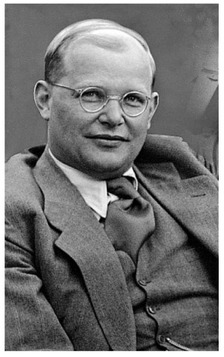| Religious nones and dones are some of the fastest growing groups in America. For those unfamiliar with the terms, “nones” are those who self identify as having no religion, including atheists, agnostics, and those who believe in God but reject particular religious traditions. “Dones” are formerly religious individuals, often people who were highly involved but became disillusioned and burned out. Articles and conversations about the nones and dones from a religious perspective often have an undercurrent of panic as people try to understand why so many are leaving organized religion. Anxiety is a normal human response to change (especially when those changes expose our own hidden doubts). But there’s a better way to think about the future of religion. It’s found in Dietrich Bonhoeffer’s letters and papers from prison. Bonhoeffer was a German Lutheran theologian, one of just a handful who took a stand against the Third Reich and spoke up for the Jewish people. Although |
In April, 1944, Bonhoeffer wrote:
We are moving toward a completely religionless time; people as they are now simply cannot be religious anymore. Even those who honestly describe themselves as "religious" do not in the least act up to it, and so they presumably mean something quite different by "religious."
Our whole nineteen-hundred-year-old Christian preaching and theology rest on the "religious a priori" of mankind. "Christianity" has always been a form--perhaps the true form--of "religion." But if one day it becomes clear that this a priori does not exist at all, but was a historically conditioned and transient form of human self-expression, and if therefore man becomes radically religionless--and I think that that is already more or less the case (else how is it, for example, that this war, in contrast to all previous ones, is not calling forth any "religious" reaction?)--what does that mean for "Christianity"? It means that the foundation is taken away from the whole of what has up to now been our "Christianity," and that there remain only a few "last survivors of the age of chivalry," or a few intellectually dishonest people that we are to pounce in fervor, pique, or indignation, in order to sell them goods? Are we to fall upon a few unfortunate people in their hour of need and exercise a sort of religious compulsion on them? If we don't want to do all that, if our final judgment must be that the Western form of Christianity, too, was only a preliminary stage to a complete absence of religion, what kind of situation emerges for us, for the church?... Are there religionless Christians? If religion is only a garment of Christianity--and even this garment has looked very different at different times--then what is a religionless Christianity?
How do we speak of God--without religion, i.e., without the temporally conditioned presuppositions of metaphysics, inwardness, and so on? How do we speak (or perhaps we cannot now even "speak" as we used to) in a "secular" way about God? In what way are we "religionless-secular" Christians, in what way are we those who are called forth, not regarding ourselves from a religious point of view as specially favored, but rather as belonging wholly to the world? In that case Christ is no longer an object of religion, but something quite different, really the Lord of the world. But what does that mean? What is the place of worship and prayer in a religionless situation?
*Bonhoeffer was influenced by Gandhi and had plans to study under him but was prevented by the war. You can read Gandhi's insightful thoughts on imitating Jesus here.
**The U.S. was still segregated when Bonhoeffer lived there. He was greatly impressed by African American spirituality in the face of this injustice.

 RSS Feed
RSS Feed
